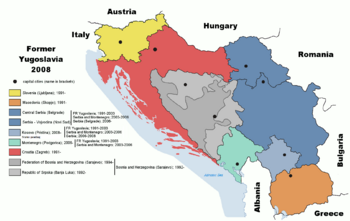Welcome to the Virtual Education Wiki ~ Open Education Wiki
Yugosphere
Experts situated in Region
Regional overview
The Yugosphere is a category used to describe the present day states which succeeded the collapse of the Socialist Federal Republic of Yugoslavia. For its members see Category:Yugosphere. The territory of the former Yugoslavia is roughly coterminous with the geographical region of the Western Balkans; in the EU's definition of the term, the Western Balkans excludes Slovenia but includes Albania.
Slovenia is the only country of the former Yugoslavia in the EU. Croatia, Macedonia, and Montenegro are official candidates, while Serbia has submitted an application for membership and have been recognized as a "potential candidate". Bosnia and Herzegovina and Republic of Kosovo have not submitted an application but are nevertheless recognized as "potential candidates" for a possible future enlargement of the European Union. All states of the former Yugoslavia, with the exception of the disputed Autonomous Province of Kosovo, have subscribed to the Stabilisation and Association Process with the EU.
The CIA Factbook has estimates for the populations of Yugoslavia's successor states as of July 2011 which amount to a total population of 23.0 million. Net population growth over the three decades between 1981 and 2011 was thus practically zero (below 0.1% p.a. on average). Ethno-linguistically, the majority of the former Yugoslavia is South Slavic, speaking a dialect continuum clustered around the Serbo-Croatian, Slovene and Macedonian. Other larger ethnic groups include Albanians (mostly in Kosovo), Hungarians (mostly in Vojvodina), Roma and other minorities.
Education in Region
Schools in Region
Further and Higher education in Region
All countries in the region are implementing the Bologna Process with an orientation towards current EU policy, notably the Lisbon strategy and its successor. Countries have started to align their policies towards the strategic EU goals (such as growth, creation of jobs, investments in higher education and research) which are especially pertinent goals for the region. The Bologna Process is a central driver in the current reform of SEE’s higher education systems and the Bologna Process is perceived as “providing a direction that is essential for societal development”. Croatia joined the Bologna Process in 2001, Bosnia, Macedonia, Montenegro, and Serbia in 2003, and Kosovo has an [(http://eacea.ec.europa.eu/tempus/participating_countries/impact/kosovo.pdf) observer status]. Another influential factor in higher education development has been the EU’s official integration politics in relation to the Western Balkan Countries. Within the politics of the region, education has always been assigned a major role in promoting democratization, socio-economic development, and civil society. The countries are eligible to participate in a number of EU programs such as TEMPUS, Erasmus Mundus (under the “WBC Window” and the “External Cooperation Window”), Youth, the framework programs for research (7th Framework Program 2007-13, including a specialized cooperation instrument for the Western Balkans), the activities of the Joint Research Centre (JRC), and the European Training Foundation (ETF).
Higher education systems have been expanding over the past decades in all European countries. The growth rates in the countries of the Yugosphere within the last 10 years have been especially high and are also among the highest worldwide. In some countries student numbers have doubled within a decade. Along with the increase in the number of students, the number of HE institutions has been increasing and quality issues arose in several countries during these times of rapid expansion. Another development has been the growing importance of private (and accredited) HEIs in the region as legislation has gradually been changed to allow the establishment of private institutions. Access to HE is mostly regulated by school leaving examination marks and entrance examinations (as in many other European countries). The accent is often put on the entrance examinations which the universities can usually regulate independently. Typical of the region is the so-called paid education in public institutions: students not achieving the necessary criteria for state-funded education can be admitted to public universities on a tuition fee basis. Fee-paying students can represent a significant resource of funds to universities and the paid education system can pose problems in terms of equal access and quality in education.
Education reform
Schools
Post-secondary
Administration and finance
Schools
Post-secondary
Quality assurance
Schools
Post-secondary
Information society
ICT in education initiatives
Virtual initiatives in schools
Virtual initiatives in post-secondary education
Lessons learnt
General lessons
Notable practices
References
- http://www.wus-austria.org/files/docs/manual5_endps.pdf
- Former Yugoslavia patches itself together: Entering the Yugosphere, Aug 20th 2009 | BELGRADE, From The Economist print edition, http://www.rcc.int/download.php?tip=docs&doc=The+Economist_Entering+the+Yugosphere_200809.pdf&doc_url=571842b83a39edf9f6318bb9faebb32a
- Free Malësia: The Yugosphere, blog posting of 2 June 2009, http://freemalesia.blogspot.com/2009/06/yugosphere.html
- The Yugo-sphere, blog posting of 28 September 2009, http://www.law.ed.ac.uk/ecclblog/blogentry.aspx?blogentryref=7915
- http://en.wikipedia.org/wiki/Former_Yugoslavia
> Yugoslavia
> VISCED supraregions
> Countries
>> VISCED
>> Main Page
